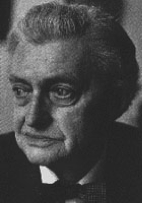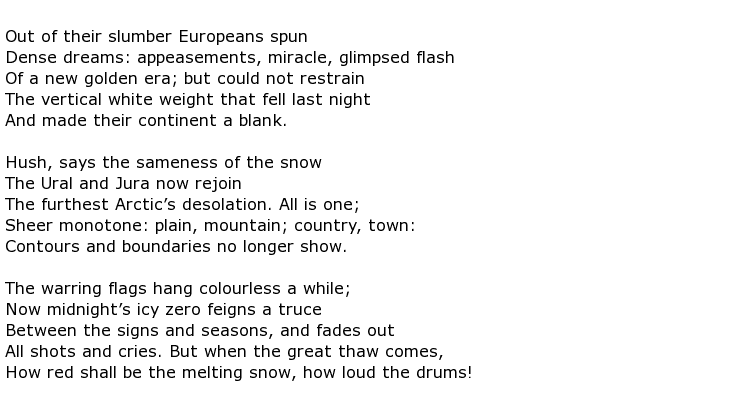 David Gascoyne was an English poet whose life spanned a good deal of the 20th century. He achieved the status of published poet at the remarkably young age of 16 with his collection called Roman Balcony and Other Poems. Incredibly, only one year later, he followed that up with a novel called Opening Day. He was one of the surrealist group of poets who were around in the 1930s and attracted some negative reviews, along with others of his ilk. Poets like Dylan Thomas and W H Auden were in vogue at this time, pretty much dominating the literary landscape with their powerful political and social observations. His poetry was, nevertheless, read and appreciated.
David Gascoyne was an English poet whose life spanned a good deal of the 20th century. He achieved the status of published poet at the remarkably young age of 16 with his collection called Roman Balcony and Other Poems. Incredibly, only one year later, he followed that up with a novel called Opening Day. He was one of the surrealist group of poets who were around in the 1930s and attracted some negative reviews, along with others of his ilk. Poets like Dylan Thomas and W H Auden were in vogue at this time, pretty much dominating the literary landscape with their powerful political and social observations. His poetry was, nevertheless, read and appreciated.
Gascoyne was born in October 1916 in the London district of Harrow. His was a fairly modest upbringing, being the son of a bank clerk although he was fortunate to receive an education at the Salisbury Cathedral School in Wiltshire. There was no university life to follow though; he moved on to the Regent Street Polytechnic in London to complete his education. Soon after he was living in Paris and was influenced by the French surrealist movement. His collection of poems in 1936 called Man’s Life is This Meat and a translation of Hölderlin’s Madness in 1938 brought the name of David Gascoyne to the fore amongst 1930s English poets. In 1936 he helped to organise the London Surrealist Exhibition where he met the artist Salvador Dali, and amusingly helped Dali out of a deep sea diving suit using a spanner!
He employed the artist Graham Sutherland to illustrate his Poems 1937-1942 and this received a modicum of critical acclaim. His associations with the likes of Dali, André Breton and Paul Eluard, mostly while resident in France, certainly enhanced his reputation and his translations of the French surrealists were to lead, in much later life, to recognition by the French Ministry of Culture. In 1996, as a reward for a lifetime of service to French literature, he was made a Chevalier dans l’Ordre des Arts et Lettres.
After the end of the Second World War Gascoyne returned to France for a two year spell (1947-48) and again in 1953, this time staying for 11 years. Published works at this time included A Vagrant and Other Poems (1950). Night Thoughts, in 1956, was adapted for radio broadcasting by the BBC. Later collections included Collected Poems which was originally published in 1965 but was so popular that it was reprinted six times by the Oxford University Press.
His poem Snow in Europe paints an evocative but chilling picture of the effects of a blanket of snow across the battlefields of Europe. It would be just as relevant for WWI as for WWII. Here are Gascoyne’s words:

Gascoyne dabbled for a while in politics and was, in the 1930s, a fervent anti-fascist. He joined the Communist party but became disillusioned with all that when he saw what was happening in Spain at that time. As time went by he found that his writing style was moving away from surrealism and into more religious and metaphysical territory. His writing output was dramatically curtailed though following a mental breakdown which saw him leave France for the last time and move back to England where he spent the rest of his days on the Isle of Wight, off the southern coast.
An amusing incident happened in the island’s Whitecroft Hospital when he met his wife to be. He heard her reading aloud one of his poems. She recounted the incident as follows:

David Gascoyne died on 25 November 2001 at the age of 85.

